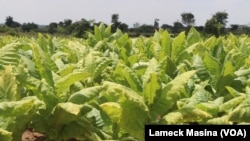Malawi’s parliament is thinking about regulation to allow the cultivation of marijuana or hashish. The purpose is to spice up the rustic’s foreign currency income however anti-drug advocates are towards it.
Malawi lawmaker Peter Dimba informed parliament Thursday that in the neighborhood grown hashish — which he referred to by means of its native identify of “chamba” — is in prime call for out of the country and may just yield hundreds of thousands of greenbacks for the rustic.
“In research that had been performed, it’s envisaged that once we get started rising our personal chamba we will generate up to $200 million in line with 12 months on the toddler degree of the business,” stated Dimba. “However because the business grows to adulthood, we will earn up to $700 million. If truth be told, it’s greater than double what we’re in reality recently getting from the sale of tobacco.”
Malawi has lengthy depended on tobacco, which accounts for approximately 13% of its gross home product and 60% of its foreign currency income.
However through the years, tobacco costs have fallen, in large part as a result of anti-smoking campaigns championed by means of the International Well being Group and the confirmed hyperlink between tobacco use and most cancers.
In 2020, Malawi enacted a legislation allowing the cultivation of hemp — the non-psychoactive a part of the hashish plant — as an alternative choice to tobacco farming. However farmers say commercial hemp hasn’t yielded the predicted effects.
Mathews Osman leads a cooperative of commercial hemp farmers in Mchinji district in central Malawi. He stated there’s a more potent marketplace for hashish with the plant’s mind-altering component, THC.
“The commercial hemp took us a very long time to discover a conceivable purchaser,” stated Osman. “With this prime THC, it kind of feels to be numerous consumers at the floor.”
Osman stated every other downside with commercial hemp was once that the seeds had been imported and dear, whilst seeds for a neighborhood hashish selection are anticipated to be less expensive.
Patrick Galawanda is the spokesperson for the non secular team Rastafarians in Malawi, which makes use of marijuana for non secular functions. He stated he hopes the legalization of hashish will stay Rastafarians from getting arrested when they’re discovered with hashish.
“We now have been crying out for this for a very long time,” he stated. “For us the Rastafarians circle of relatives, we use this for non secular functions and for medicinal functions. So that they will have to forestall arresting Rastafarians for the sake of hashish.”
Some Malawians need hashish cultivation to stay unlawful. Nelson Zakeyu is government director for Drug Combat Malawi, a neighborhood NGO which has lengthy fought towards drug abuse.
“That is worrisome as a result of hashish is a drug,” stated Zakeyu. “Hashish is toxic. It is extremely, very problematic particularly to youngsters as a result of scientists have stated that when younger other people underneath the age of 21 get started the use of hashish, their mind is completely broken.”
Zakeyu stated every other fear is that in line with analysis his group carried out final 12 months, the selection of youngsters the use of hashish doubled quickly after Malawi legalized the usage of commercial hemp in 2020.
He stated the quantity would bounce additional if hashish with a prime content material of THC may well be legally grown.
Richard Chimwendo Banda is the chief of presidency lawmakers in parliament.
He stated the federal government will deal with the topic with warning.
“As govt, we’re very wary as a result of we’ve the obligation to give protection to our younger other people. And we can be sure that anything that is available in protects our younger other people and protects the country,” he stated. “However, in terms of the industrial advantages of it, we will have to make sure that we facilitate the industrial good thing about it.”
Lawmakers are nonetheless running at the invoice to amend current regulations on hashish; it’s not transparent when the measure would possibly arise for a vote.















